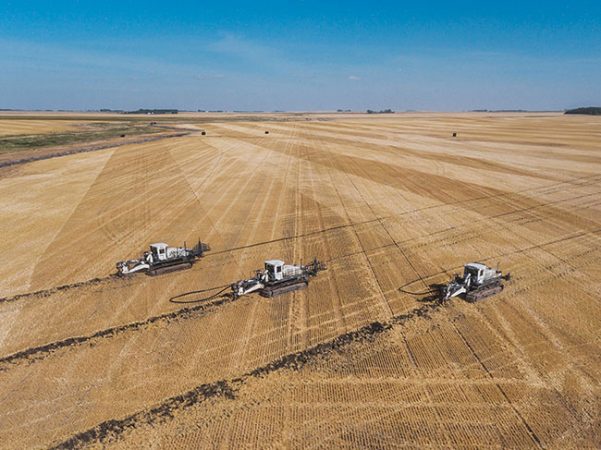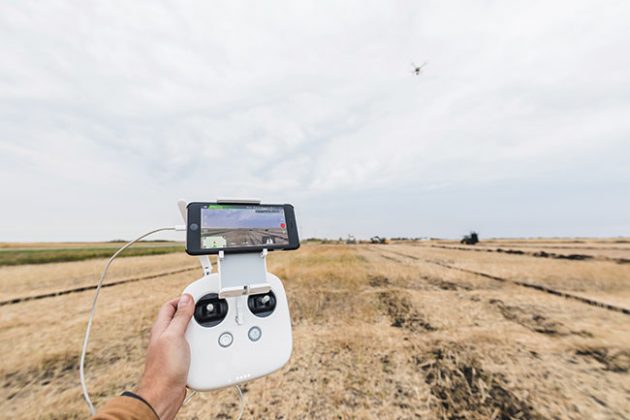
Features
Contractor at Work
Driving growth: Manitoba drainage company sees success
NextGen Drainage: a prairie success story.
November 13, 2019 By Julienne Isaacs
 The company installs pattern tile projects anywhere from 20 acres to 1,200 acres in size; they’ve worked throughout the Prairie provinces but these days are focused on Manitoba and Saskatchewan.
The company installs pattern tile projects anywhere from 20 acres to 1,200 acres in size; they’ve worked throughout the Prairie provinces but these days are focused on Manitoba and Saskatchewan. He’s the president of NextGen Drainage Solutions, one of Canada’s top 500 fastest-growing companies, but Brett Sheffield didn’t have the most conventional start in the drainage industry. In fact, he started in another industry altogether.
“Initially I was going to be a gym teacher,” he says. “Then I went to university and ended up traveling abroad before coming back to our farm. I wasn’t a big fan of cattle farming, so I started purchasing and renting land and got back into grain.”
Sheffield quickly grew the family farm at Pilot Mound, MB, from 500 to 4,200 acres while studying agriculture at the University of Manitoba. He also purchased a local fitness club and started investing in other businesses.While studying drainage under Don Flaten in the department of soil science, Sheffield grew inspired by what he learned. He enrolled in drainage programs at the University of Guelph, Ohio State University and North Dakota State University to broaden his knowledge of research and issues impacting the industry.
“I started to see that there might be a business opportunity in drainage,” he says.
Along with his wife, Jen, Sheffield registered his company, NextGen Drainage Solutions, in 2012.
Sheffield’s initiative attracted notice, and that year he won Enactus Canada’s 2012 Student Entrepreneur National Championship. He went on to represent Canada at the Global Student Entrepreneur Awards and placed third globally.
Industry connections followed hot on the heels of Sheffield’s success. Roger Ellingson, owner of Minnesota-based Ellingson Companies, became Sheffield’s mentor and an early investor in NextGen Drainage, as well as a member of an advisory board Brett and Jen set up to get the business headed in the right direction.
It wasn’t long before Sheffield took over full ownership of the company. Since 2012, NextGen has gone from two full-time employees – Brett and Jen – to more than 20 full-time employees in 2019, including a complete management team and a group of experienced installers.
The company’s rapid growth earned its achievement as one of Canada’s top 500 fastest-growing companies, but Sheffield says NextGen has reached its ideal size for now.
“We’ve grown from a mom and pop shop to a mid-sized company,” he says. “Quality is so important to us and we use LEAN management [processes] to install more acres per machine while maintaining that quality. We can offer the best quality and still be profitable at this size.”
“Quality is so important to us and we use LEAN management [processes] to install more acres per machine while maintaining that quality.”
Partnerships and education
NextGen offers turnkey services to its customers, “everything from working with growers to surveying, tile drainage design, permitting and installation of tile drainage,” Sheffield explains.
The company installs pattern tile projects anywhere from 20 acres to 1,200 acres in size; they’ve worked throughout the Prairie provinces but these days are focused on Manitoba and Saskatchewan.

Along with his wife, Jen, Brett Sheffield registered his company, NextGen Drainage Solutions, in 2012.

Earlier this year, NextGen partnered with Farmers Edge to offer data-driven water management and soil moisture tools to its client base.
Earlier this year, NextGen partnered with Farmers Edge to offer data-driven water management and soil moisture tools to its client base.
“We added in end-point management, so we use NDVI drone and satellite imaging to monitor water coming off the field, so we know how our systems are working,” he explains. “We use NDVI to look at how crops and soil types are reacting to spacings, especially for warranty, if there’s a break. That’s just one tool that we use.”
The arrangement is one of many strategic partnerships NextGen has undertaken over the years. Sheffield works hard at maintaining and growing industry connections in order to deliver the best service to NextGen’s customers. But these days, he says, NextGen can provide most services in-house.
It’s the company’s track record in customer service, however, that Sheffield is most proud of.
“We’ve been aggressive and have focused on customer service and built up repeat customers. NextGen has a very high customer return rate, with the majority of customers building long-term plans for multiple projects,” Sheffield notes.
But NextGen has another important focus: they also offer government relations, working with all levels of government to offer education on tile drainage and iron out permitting issues.
Installation permitting represents a huge challenge for the drainage industry, Sheffield says. Problems with permitting in Alberta led NextGen to pull out of the province altogether. In some cases the company has been waiting on permits in Alberta for more than two years, he says.
In Manitoba and Saskatchewan, the picture is better but still not ideal; in most cases, NextGen has to wait between three and 16 months for installation permits to come through.
Saskatchewan’s Water Security Agency has moved to a qualified person (QP) system to assist agricultural landowners with water management projects. The system requires self-designated or accredited QPs to review and approve new projects. But Sheffield says farmers typically wait for six months to receive approval, which can delay projects a full year if they wait until the fall to submit a permit.
“It can be really difficult to be a drainage contractor in this climate,” Sheffield says. “We’re really trying to work with and educate all forms of government. We’re opening our systems so they can do end-point testing for nutrients and see how many gallons per minute are flowing out of our outlets. Whatever we can do to help the industry with permits, we’ll do.”
“It can be really difficult to be a drainage contractor in this climate,” Sheffield says. “We’re really trying to work with and educate all forms of government. We’re opening our systems so they can do end-point testing for nutrients and see how many gallons per minute are flowing out of our outlets. Whatever we can do to help the industry with permits, we’ll do.”
Sheffield has joined with other contractors to form the Prairie Water Management Association. The group is in its early stages, but their goal is to work with government and industry partners to illustrate the benefits of tile drainage in Manitoba.
He believes the drainage industry has a huge amount to offer the Prairies – but Sheffield doesn’t have any advice to offer other contractors.
“Each of us has our own way of going about business. As long as we’re all doing our best to do quality install and provide customer service, it’s good for the industry,” he says. “Drain tile is a product that can change a farm for the better. It’s one of the most positive things farmers can do apart from buying more land. It also represents a great opportunity to provide economic growth and jobs to rural communities, and improved land and crop growth in areas that typically couldn’t sustain it.”
Print this page